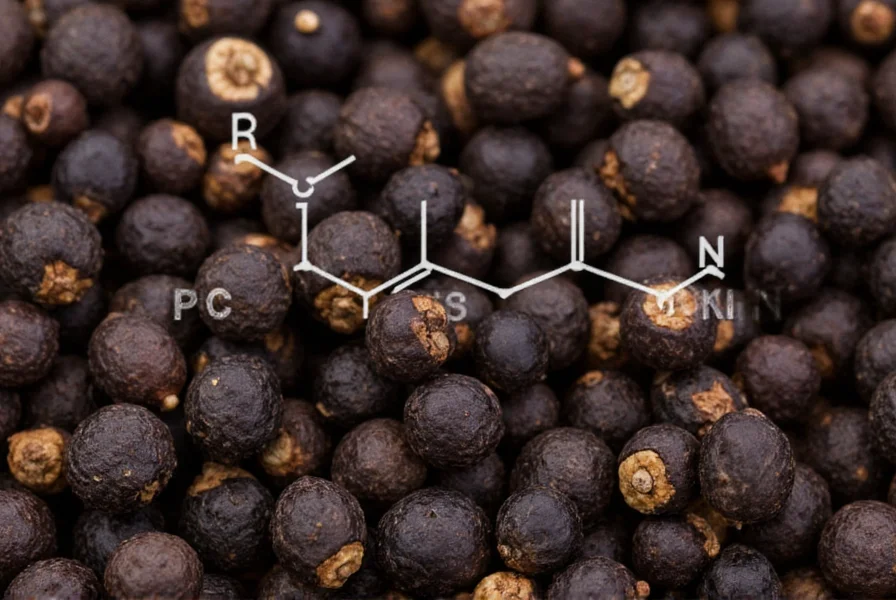The Science Behind Pepper's Health-Promoting Properties
When exploring pepper benefits for human health, we must first understand that black pepper (Piper nigrum) contains piperine, a bioactive alkaloid responsible for most of its therapeutic effects. This compound has been studied extensively in clinical research, revealing multiple mechanisms through which black pepper contributes to wellness.
Unlike many natural remedies with unproven health claims, black pepper's benefits are supported by substantial scientific evidence. A landmark study published in Planta Medica demonstrated that piperine increases the bioavailability of key nutrients like curcumin by 2000%, making it a valuable addition to nutrient-dense meals.
Types of Peppers and Their Distinct Benefits
While black pepper receives the most research attention, other varieties offer unique advantages:
- Black pepper - Highest piperine content (5-9%), strongest bioavailability enhancement
- White pepper - Milder flavor, slightly lower piperine concentration
- Green pepper - Contains different phytochemicals with potential antimicrobial properties
- Pink pepper - Not true pepper; comes from a different plant family
| Nutrient | Amount per Teaspoon (2g) | Health Significance |
|---|---|---|
| Piperine | 20-40mg | Enhances nutrient absorption, anti-inflammatory |
| Manganese | 14% DV | Supports bone health and metabolism |
| Vitamin K | 2% DV | Essential for blood clotting |
| Dietary Fiber | 0.5g | Promotes digestive health |

Key Health Benefits of Black Pepper: Evidence-Based Analysis
Enhanced Nutrient Bioavailability
One of the most well-documented scientific benefits of pepper consumption is its ability to dramatically increase the absorption of various nutrients and medications. Research shows piperine inhibits enzymes in the liver and intestines that metabolize compounds, allowing more to enter circulation. This explains why traditional Indian cuisine often combines turmeric with black pepper - the piperine makes curcumin up to 2000% more bioavailable.
Powerful Anti-Inflammatory Effects
Chronic inflammation underlies many modern diseases. Studies in the Journal of Agricultural and Food Chemistry demonstrate that piperine suppresses inflammatory pathways by inhibiting NF-kB activation. Regular consumption of black pepper may help reduce markers of inflammation, potentially benefiting those with arthritis or other inflammatory conditions.
Digestive System Support
Black pepper stimulates hydrochloric acid production in the stomach, improving pepper benefits for digestion and nutrient breakdown. This explains its traditional use as a digestive aid. Research indicates it may also support healthy gut microbiota composition, though more human studies are needed in this area.
Antioxidant Protection
Pepper contains multiple antioxidants that combat oxidative stress. A study in Food Chemistry found black pepper extracts demonstrated significant free radical scavenging activity, potentially reducing cellular damage that contributes to aging and chronic disease.
Cognitive and Metabolic Benefits
Emerging research suggests piperine may support brain health by increasing brain-derived neurotrophic factor (BDNF) levels. Additionally, animal studies indicate potential benefits for metabolic health, including improved insulin sensitivity - though human trials are still limited in this area.
Practical Applications: Maximizing Pepper Benefits
To reap the health benefits of black pepper in daily diet, consider these evidence-based strategies:
- Grind fresh pepper onto cooked foods (heat degrades piperine)
- Combine with turmeric-containing dishes for enhanced curcumin absorption
- Use in moderation (1/4-1/2 teaspoon daily provides therapeutic piperine levels)
- Store in airtight containers away from light to preserve potency
Safety Considerations and Potential Side Effects
Black pepper is generally safe when consumed in culinary amounts. However, those considering pepper supplements for health benefits should note:
- High doses (above 15-20mg piperine daily) may cause gastrointestinal discomfort
- Piperine can interact with certain medications by increasing their absorption
- Pregnant women should avoid medicinal doses but can safely use culinary amounts
- Those with ulcers or GERD may experience symptom exacerbation
Pepper Benefits Compared to Other Common Spices
While many spices offer health advantages, black pepper's unique value lies in its bioavailability-enhancing properties. Unlike turmeric, ginger, or garlic which primarily provide direct health effects, black pepper amplifies the benefits of other foods and supplements you consume. This synergistic effect makes it particularly valuable in a holistic nutrition approach.
Conclusion: Integrating Pepper into a Health-Conscious Lifestyle
The evidence-based health benefits of black pepper make it more than just a flavor enhancer. Its ability to improve nutrient absorption, reduce inflammation, and provide antioxidant protection offers tangible health advantages when incorporated wisely into daily meals. While not a miracle cure, black pepper represents a simple, evidence-backed addition to a health-conscious diet that can amplify the benefits of other nutritious foods you consume.
Frequently Asked Questions
What is the main compound responsible for pepper benefits?
Piperine is the primary bioactive compound in black pepper responsible for most health benefits. This alkaloid constitutes 5-9% of black pepper by weight and has been extensively studied for its ability to enhance nutrient absorption, provide anti-inflammatory effects, and deliver antioxidant protection.
How much black pepper should I consume daily for health benefits?
For therapeutic benefits without potential side effects, 1/4 to 1/2 teaspoon (approximately 1-2 grams) of freshly ground black pepper daily is sufficient. This provides 20-40mg of piperine, the amount used in most clinical studies showing benefits. Culinary use in normal food preparation typically falls within this range.
Can black pepper really improve nutrient absorption?
Yes, multiple studies confirm black pepper significantly enhances nutrient absorption. Research shows piperine can increase the bioavailability of curcumin by up to 2000%, beta-carotene by 60%, and selenium by 30-63%. It works by inhibiting certain liver and intestinal enzymes that break down compounds before they enter circulation.
Are there any medications that interact with black pepper?
Yes, piperine can interact with medications metabolized by the CYP3A4 and P-glycoprotein pathways. This includes certain blood thinners, anti-seizure medications, and some chemotherapy drugs. If you take prescription medications, consult your healthcare provider before consuming black pepper in medicinal amounts (beyond normal culinary use).
Does the type of pepper affect its health benefits?
Yes, black pepper contains the highest concentration of piperine (5-9%) compared to white pepper (3-5%) or green pepper (lower concentrations). True peppercorns (from Piper nigrum) provide the documented health benefits, while pink peppercorns come from a different plant family and don't contain piperine. For maximum health benefits, choose freshly ground black pepper.











 浙公网安备
33010002000092号
浙公网安备
33010002000092号 浙B2-20120091-4
浙B2-20120091-4